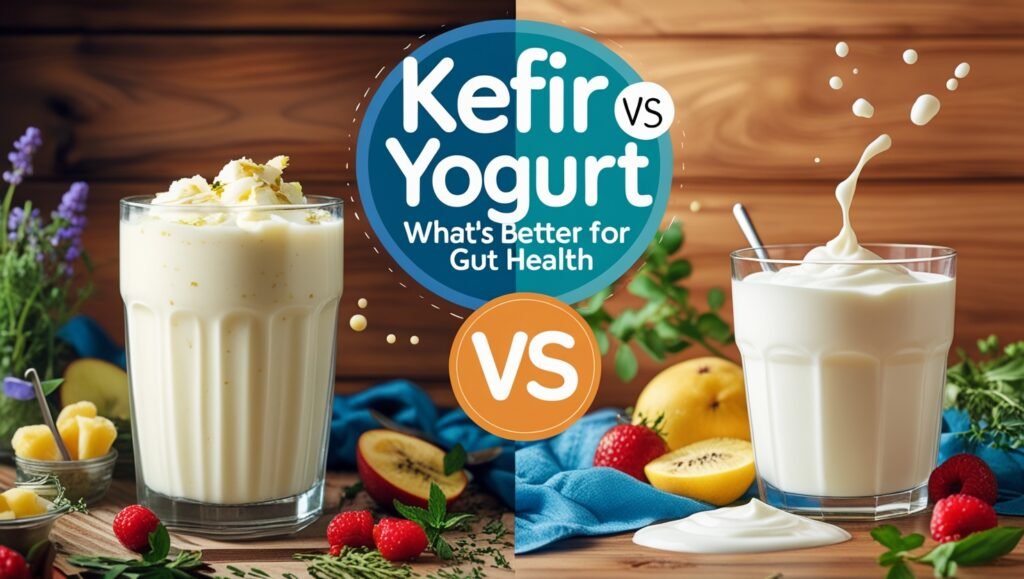Kefir vs. Yogurt: What’s Better for Gut Health? A Science-Backed Guide -Comparisons based on probiotics diversity, lactose content, and fermentation.
What My Grandmother Didn’t Know About Her “Curd” When I was a child, my grandmother swore by a bowl of homemade yogurt (curd) every morning. She believed it kept her stomach “cool” and digestion “light.” But it wasn’t until I struggled with post-antibiotic gut issues in my 20s that I began questioning—was yogurt enough?
That’s when I stumbled upon kefir.
This strange, tangy drink fermented with grains (not actual grains, but colonies of bacteria and yeast) not only helped ease my bloating but also improved my sleep and skin. I dove deep into researching what made kefir different—and possibly better—than the yogurt I grew up with.
Let’s break down this comparison with facts, not assumptions.
1. Probiotic Diversity: Kefir Has the Upper Hand
While both kefir and yogurt are probiotic-rich, kefir contains a broader spectrum of microorganisms. According to the Journal of Dairy Science, traditional kefir contains up to 50 strains of beneficial bacteria and yeasts, while yogurt typically contains only 2–7 strains, usually Lactobacillus bulgaricus and Streptococcus thermophilus.
Source: Journal of Dairy Science, 2013
This diversity is crucial, as a diverse microbiome is linked with:
-
Better immune response
-
Enhanced digestion
-
Reduced risk of IBS, IBD, and even mood disorders
-
Improved skin health (via the gut-skin axis)
Hidden Fact: Kefir also contains beneficial yeasts (like Saccharomyces and Kluyveromyces) which yogurt does not, helping fight off candida overgrowth in the gut.
2. Lactose Content: Kefir Is Easier to Digest
Many people with lactose intolerance can’t digest regular yogurt—especially store-bought ones with added milk solids.
But kefir is fermented for a longer period (usually 24–48 hours), allowing more lactose to be broken down into lactic acid by the microorganisms. A 2003 study in Nutrition Research found that kefir consumption improved lactose digestion by 54% in lactose-intolerant individuals, compared to 27% improvement from yogurt.
Source: Nutrition Research, 2003
Best Option for Lactose-Intolerant? → Kefir wins.
3. Fermentation Process: Slow vs. Fast Impact
Yogurt is typically fermented using thermophilic bacteria (at 110°F for 4–6 hours), while kefir uses mesophilic cultures (at room temperature for 24–48 hours). This longer fermentation in kefir:
-
Produces more bioactive peptides, which have anti-inflammatory and antimicrobial properties.
-
Leads to higher B-vitamin content, especially B12 and folate.
Source: Comprehensive Reviews in Food Science, 2018
4. Texture, Taste, and Versatility
| Feature | Yogurt | Kefir |
|---|---|---|
| Texture | Thick, spoonable | Thin, drinkable |
| Taste | Mildly tangy | Tart and slightly fizzy |
| Probiotic Type | Bacteria only | Bacteria + Yeast |
| Lactose | Moderate | Low |
| Strain Count | 2–7 | 30–50 |
5. What Most Blogs Don’t Tell You
➤ Kefir May Help Rebuild Gut Flora Faster After Antibiotics
Because kefir contains multiple species of spore-forming and colonizing bacteria, it may better repopulate your gut after disruption from medications.
➤ Yogurt Is Not Always “Live Culture”
Store-bought yogurt is often pasteurized after fermentation, killing off probiotics. Look for “live and active cultures” on the label—or make it at home.
➤ Kefir’s Poly-Yeast Profile May Fight SIBO (Small Intestinal Bacterial Overgrowth)
Yogurt can exacerbate SIBO due to certain lactate-producing strains, but kefir’s yeasts may inhibit bacterial overgrowth and restore balance.
Verdict: Kefir Is More Potent for Gut Health
While yogurt still has its place (especially homemade, raw milk versions), kefir emerges as the probiotic powerhouse for anyone dealing with:
-
Digestive issues
-
Post-antibiotic gut repair
-
Lactose intolerance
-
Autoimmune inflammation
-
Gut-related skin and mental health problems
Kefir yogurt benefits
Curious about kefir and yogurt? Learn how they differ in probiotic content, digestive health, lactose tolerance, and immunity. Discover which one suits your gut and lifestyle better.
The Breakfast Battle Begins…
Imagine this: it’s 7 AM, and you’re staring at your fridge. On one shelf is your trusted bowl of creamy yogurt. On another is a bottle of tangy homemade kefir bubbling with life.
You’ve heard both are good for your gut, but which one is actually better?
That’s not just a food question—it’s a health question.
In this article, we’ll dive deep into the real health benefits of kefir vs. yogurt—comparing them based on:
-
Probiotic strength
-
Digestive support
-
Lactose tolerance
-
Immune system effects
-
Skin and mental health
1. Probiotic Power: Kefir Wins (Hands Down)
Kefir contains 30–50 strains of beneficial bacteria and yeasts, while yogurt typically has only 2–7 strains (like Lactobacillus bulgaricus and Streptococcus thermophilus).
According to the Journal of Dairy Science, kefir has a higher diversity of microbial species, making it more potent for gut flora restoration.
Why it matters: A diverse microbiome supports everything from digestion to mental clarity.
Winner: Kefir
2. Lactose Digestion: Kefir Is Easier on the Gut
Kefir grains contain lactase enzymes that break down lactose, the sugar in milk that causes bloating in many people. Yogurt also helps but not as completely as kefir.
A 2003 study in the American Journal of Clinical Nutrition found that kefir reduces lactose intolerance symptoms better than yogurt or milk.
Bonus: Water kefir and coconut kefir are 100% lactose-free, perfect for vegans or dairy-sensitive folks.
Winner: Kefir
3. Mental Health & Gut-Brain Axis: Kefir Takes the Lead
Kefir contains unique probiotics like Lactobacillus kefiri and yeasts like Saccharomyces, which may influence the gut-brain axis.
A 2019 paper in Nutrients reports that kefir may reduce anxiety, improve mood, and support neurotransmitter balance better than standard yogurt.
Why it matters: Your gut health directly affects your brain, sleep, and mood.
Winner: Kefir
4. Immune System: Both Help, But Kefir Offers More Diversity
Both kefir and yogurt boost your immune system, but kefir’s greater microbial diversity and presence of anti-inflammatory peptides give it an edge.
A 2015 review in Frontiers in Microbiology found that kefir strengthens the immune barrier in the gut and reduces inflammation.
Winner: Kefir
5. Skin Benefits: Tie
Both can help with skin issues through gut health improvement. People have reported reduced acne, eczema, and rosacea flare-ups after consistent use of either yogurt or kefir.
Note: Fermented foods help by balancing the gut microbiome, which in turn calms systemic inflammation that shows up on the skin.
Winner: Tie
6. Taste, Texture & Use in Recipes: Yogurt Wins for Creaminess
Kefir is drinkable and tart, while yogurt is thick and creamy—better for bowls and smoothies.
If you like rich texture, yogurt wins. If you like sour punch, kefir’s your pick.
Winner: Yogurt (for creaminess & versatility)
Summary Table: Kefir vs Yogurt Benefits
| Health Aspect | Kefir | Yogurt |
|---|---|---|
| Probiotic Diversity | ✔️ 30–50 strains | ❌ 2–7 strains |
| Lactose Digestion | ✔️ Better (with enzymes) | ❌ Good, but not ideal |
| Gut Restoration | ✔️ Faster recovery | ❌ Slower effect |
| Skin & Immunity | ✔️ Anti-inflammatory peptides | ✔️ Also beneficial |
| Brain & Mood | ✔️ Gut-brain impact | ❌ Limited research |
| Texture & Taste | ❌ Thin, tangy | ✔️ Creamy, mild |
Final Verdict
If your goal is:
-
Max gut health restoration
-
Better digestion
-
More probiotic power
Then kefir is the better choice.
If you’re looking for:
-
Thicker texture
-
Milder taste
-
Simple add-on to meals
Then yogurt is easier to integrate.
Want to Try Kefir at Home?
Don’t buy bottled kefir from the store — they’re often pasteurized, full of sugar, and have fewer live cultures.
Instead, make your own using organic kefir grains from JPS Ayurvedic Pharmacy — we ship across India for free.
Want to get started? You can buy organic milk kefir grains, water kefir grains, and kombucha SCOBY from JPS Ayurvedic Pharmacy with free shipping across India.
Buy with Confidence:
All products are shipped fresh, organic, and ready to use, with free shipping across India.
If you have any questions about our products, we’re always happy to help before you place your order.
📞 WhatsApp Support: +91-9877194003 | +91-9646088764

